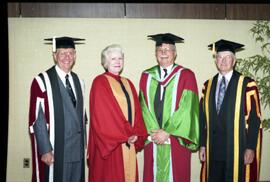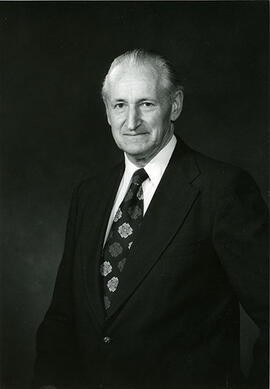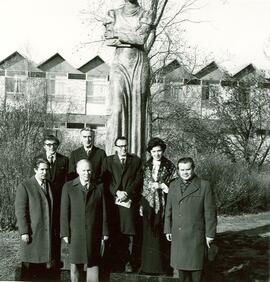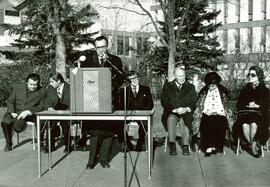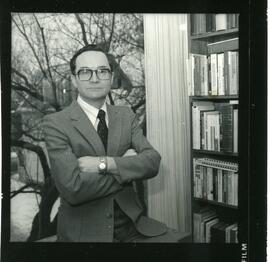Honourary Degrees - Presentation - Elizabeth Dowdeswell
- A-12355
- Item
- May 1994
Elizabeth Dowdeswell, honourary Doctor of Laws degree recipient, stands in academic gown with George Ivany, University President, E.K. (Ted) Turner, University Chancellor, and an unidentified man during Spring Convocation held at Centennial Auditorium.
Bio/Historical Note: Violet Elizabeth (Patton) Dowdeswell was born in 1944 in the County of Antrim in Northern Ireland and brought up in an Ulster Scot tradition that puts great emphasis on scholastic achievement. Her family, father emigrated to Canada when she was five, settling in southern Saskatchewan and her childhood influences were those common to the smaller towns (Sceptre. Young, Strasbourg and Briercrest). Dowdeswell worked for the Extension Division, as a 4-H specialist each May to September when she was completing a degree in Home Economics degree and teaching certificate at the U of S. Upon graduation she became a teacher and counsellor at Swift Current Comprehensive School, finding time as well to upgrade and to complete an MSc in behavioural science at Utah State University by 1972. Following a year as a lecturer in economics and marketing at the University of Alberta. Dowdeswell returned to the Saskatchewan Department of Education as a consumer education consultant and later as the Human Rights Ombudsman before being put in charge of federal/provincial education matters. She moved to Ottawa in 1982 to work first with the Treasury Board and then with Environment Canada. After directing the Ontario office of Environment Canada, she became Assistant Deputy Minister of the Atmospheric Environment Service. Her job required community involvement and an understanding of the socioeconomic aspects of global change as she helped develop public services such as the Ozone Watch and the UV-B Index. Dowdeswell was Canada's representative to the World Meteorological Organization and in 1992 again represented Canada as principal delegate to the Intergovernmental Panel on Climate Change at the Earth Summit Conference in Rio de Janeiro. At Rio, as co-chair of a working group on the United Nations Framework Convention on Climate Change, her leadership helped confirm Canada's position in the forefront of world sustainable development. She was appointed Executive Director of the United Nations Environment Programme (UNEP) in late 1992, and was asked to combine this with the position of Executive Director of the United Nations HABITAT Programme. Elizabeth Dowdeswell was the highest-ranking Canadian and the most senior of a handful of women to top UN positions (2012). She was appointed Lieutenant Governor of Ontario in 2014.



